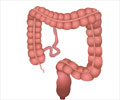- Small bowel bacterial overgrowth - (https://medlineplus.gov/ency/article/000222.htm)
- About Small Intestine Bacterial Overgrowth - (https://www.winchesterhospital.org/health-library/article?id=646938)
- Diet for Those With Small Bowel Bacterial Overgrowt - (hhttps://med.virginia.edu/ginutrition/wp-content/uploads/sites/199/2014/04/SBBO-Diet-10-27-16.pdf)
- What is small bowel bacterial overgrowth? - (https://www.chop.edu/conditions-diseases/small-bowel-bacterial-overgrowth)
- FODMAP Diet: What You Need to Know - (https://www.hopkinsmedicine.org/health/wellness-and-prevention/fodmap-diet-what-you-need-to-know)
- Over view of Small intestinal bacterial overgrowth (SIBO) - (https://www.mayoclinic.org/diseases-conditions/small-intestinal-bacterial-overgrowth/symptoms-causes/syc-20370168)
- Top Indicators of SIBO - (https://nunm.edu/2019/05/sibo-indications/)
- Small intestinal bacterial overgrowth (SIBO) Diagnosis & Treatment - (https://www.mayoclinic.org/diseases-conditions/small-intestinal-bacterial-overgrowth/diagnosis-treatment/drc-20370172)
- Sachdev AH, Pimentel M. Gastrointestinal bacterial overgrowth: pathogenesis and clinical significance. TherAdv Chronic Dis. 2013;4(5):223-231 - (doi:10.1177/2040622313496126)
What is Small Intestine Bacterial Overgrowth (SIBO)?
Microorganisms typically exist in our gastrointestinal tract and take part in the digestion of food materials. ‘Small Intestine Bacterial Overgrowth’ (SIBO) occurs when there is a significant rise in bacteria that do not usually thrive in the small intestine. These bacteria can impair the enzymatic and absorptive properties of the intestine. In general, this condition arises as a secondary health issue due to many other underlying diseases. This condition is sometimes called blind loop syndrome.
What are the Causes of Small Intestine Bacterial Overgrowth?
The bacterial overgrowth syndrome occurs mainly when anyone of the following three conditions arises or prevails in our digestive system -
- Reduction in the acid production of the gastrointestinal tract
- Decrease in the movement of the gastrointestinal tract
- Damage in the lining of intestines
These conditions prevent the movement of food particles and bacteria through the small intestine, allowing them to thrive there for a long time and multiply.
The causes of the above conditions could be -
- Rare congenital abnormalities (abnormalities that are present from birth) like short bowel syndromein which people are born with short small bowels
- Abdominal surgeries that could create a loop of the small intestine eg: Gastrectomy, Ileostomy
- Abdominal injuries
- Gastrointestinal disorders like Crohn's disease, Diverticulosis, Irritable bowel syndrome, Gastroparesis, Celiac disease, and Pancreatitis.
- Certain health conditions like scleroderma (hardening of the skin)
- Medications eg: Narcotics (Slow down intestinal movement) and Proton pump inhibitors (Reduce acid production in the gut)
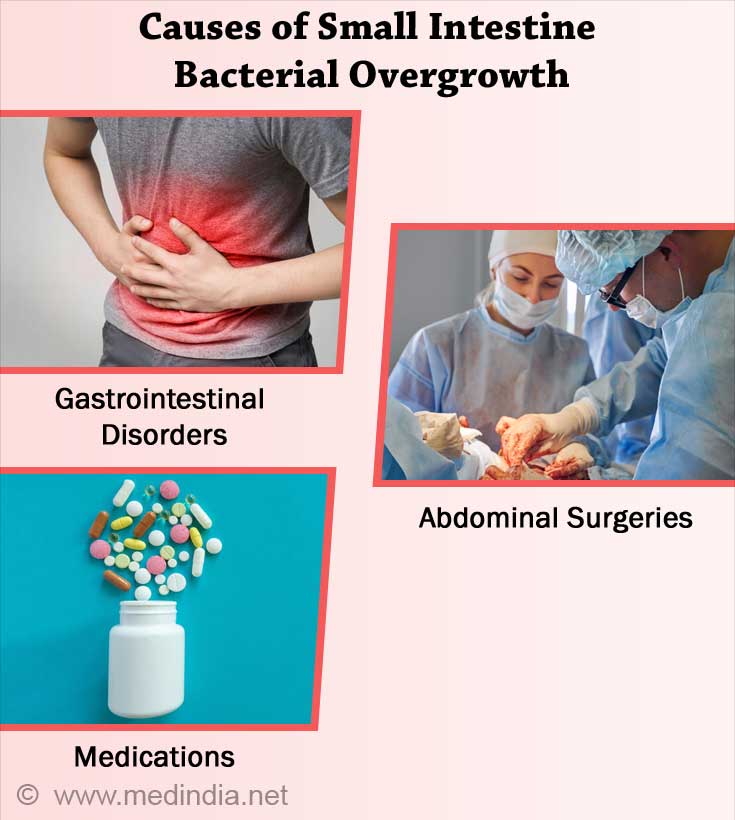
The most commonly encountered bacteria in SIBO are Bacteroides, Campylobacter, Enterococcus, Escherichia coli, Klebsiella pneumonia, Proteus mirabilis, and Salmonella.
SIBO represents the outgrowth of some bacteria in the wrong location (small intestine). Hence, it is not always the bad bacterial community that causes SIBO. Even some friendly bacteria that belong to the large intestine could also be the reason for SIBO.
What are the Symptoms & Signs of Small Intestine Bacterial Overgrowth?
The symptoms of SIBO are not usually specific and can portray any related gastrointestinal disorders.
The common symptoms of SIBO include:
- Abdominal pain
- Bloating Constipation
- Diarrhea
- Gassiness
- Loss of appetite
- Nausea
- Unexplained weight loss
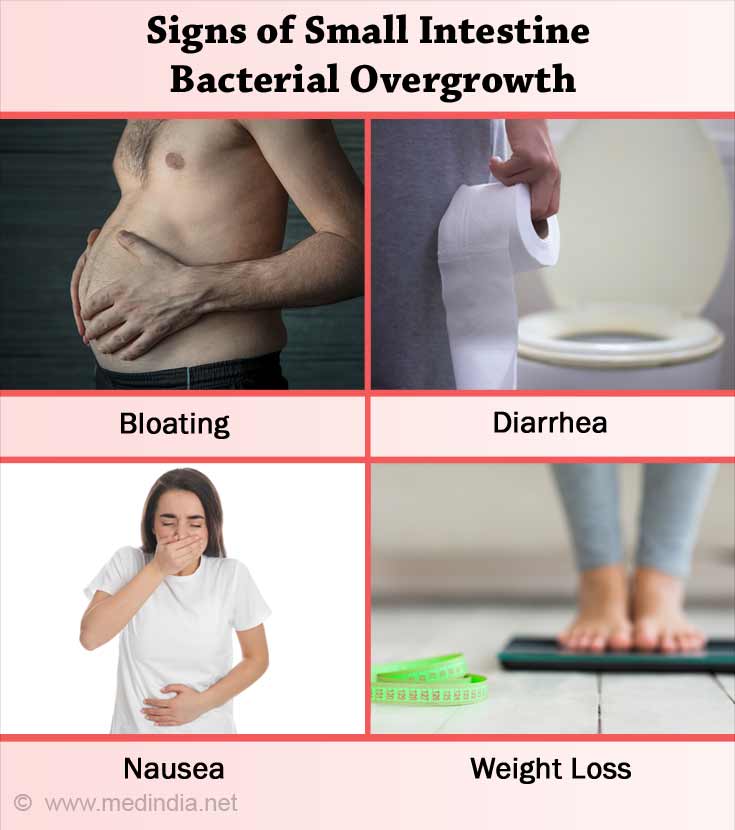
What are the Complications of Small Intestine Bacterial Overgrowth?
SIBO can cause multiple complications ranging from mild to serious.
1. Malabsorption
It is the most important complication of SIBO. The bacteria crowded in the small intestine exploit much of the nutrients in food and damage the intestinal lining, making it difficult for the body to take up nutrients. This can lead to poor absorption of carbohydrates and proteins.
In the long run, the bacteria can also break down the bile salts involved in the digestion of fats, causing the inability to absorb fats. As a result, the absorption of fat-soluble vitamins (Vitamins A, D, E, K) might also be impaired. Further, vitamin B-12 deficiency could also occur as the bacteria consume it for their metabolism.
2. Kidney stones
Some people might develop kidney stones due to the lack of adequate calcium absorption by the body.
3. Bone-related disorders
The poor absorption of vitamin D and calcium can cause bone diseases like osteoporosis (weak and brittle bones) and osteomalacia (soft bones).
4. Dehydration
Due to the complications developed by SIBO, like diarrhea, some people might experience dehydration frequently.
5. Inflammation of the intestine
As SIBO disturbs the balance of the gut microbiome, it may induce a harmful immune response in the gut, causing mucosal inflammation in some people.
How is Small Intestine Bacterial Overgrowth diagnosed?
To diagnose SIBO, the doctor first performs a physical examination to evaluate the malabsorption and underlying abdominal issues. After this, the following tests are performed based on the patient's medical history and health conditions.
1. Breath testing
It is the most popular test to diagnose SIBO. The bacteria crowded in the small intestine digest the sugars we consume and release hydrogen and methane as the end products. Therefore, a breath test measures the amount of these gases in the air we exhale after consuming a sugar solution (usually glucose or lactulose solutions). An increase in the amount of these gases is indicative of bacterial overgrowth in the small intestine.
2. Bacterial culturing
This is the direct microbiological analysis of SIBO. The intestinal fluid is aspirated using an endoscopy procedure, and the sample is used to grow and test the bacteria under laboratory conditions. As the method is invasive, it is less commonly used.
3. Blood tests
Blood tests like the Complete Blood Count test (CBC) and nutrient profile tests are suggested to determine the level of infection and nutrient deficiencies.
4. Stool evaluation tests
Stool evaluation tests are a set of laboratory analyses that help diagnose certain digestive disorders using the stool samples collected from the patient. These tests are used to diagnose fat malabsorption.
5. Diagnostic imaging
Abdominal and bowel imaging using CT-scan, MRI, and X-ray is recommended to see any structural abnormalities in the patient.
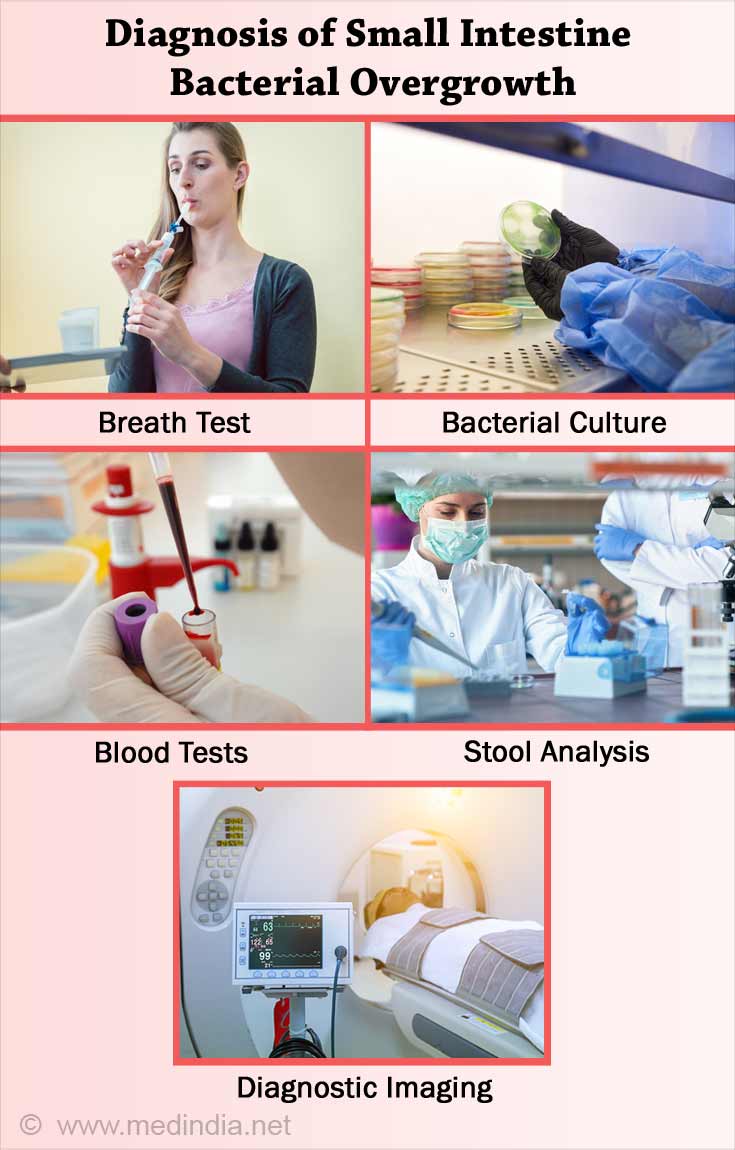
How is SIBO treated?
The treatment for SIBO focuses on reducing the overgrowth of bacteria and increasing intestinal mobility.
Let us see the two common ways to treat SIBO
1. Medications
Antibiotics are considered a powerful way to treat bacterial overgrowth syndrome. Some of the antibiotics used to treat SIBO are,
- Amoxicillin
- Ciprofloxacin
- Metronidazole
- Rifaximin
The specific type of antibiotic is chosen based on the patient's medical history and administered for a short period. Some healthcare practitioners also recommend the usage of drugs that increase the intestinal motility of the intestines.
2. Nutritional support
The severe complications of SIBO, including malnutrition and weight loss, can be corrected by proper nutritional support. These include the usage of supplements and probiotics.
- Nutritional supplements
People who experience malnourishment due to SIBO are recommended to use vitamin and mineral supplements by nutritionists. Oral supplements of vitamin A, C, D, E, some B-vitamins, and supplements for calcium and iron are advised in general. In addition, some people might need intramuscular injections of vitamin B-12. - Probiotics
Probiotics help the human body fight against harmful bacteria and maintain a healthy balance of the gut microbial community. In addition, they help repair the gut and support the intestine in the management of bacterial overgrowth syndrome. A short course of oral probiotic supplements in the form of capsules, liquids, or powders is recommended for most SIBO patients to heal the intestines.
How to Prevent Small Intestine Bacterial Overgrowth?
Although medications can treat SIBO, the complications caused by SIBO cannot be reversed in some patients. In addition, the use of antibiotics might also wipe out most bacteria irrespective of their role in the intestines. Hence, doctors concentrate on preventing the disease itself in the first place.
The only way to prevent SIBO is to treat the underlying conditions. For example, surgical repair of the section of bowel that maybe leading to a blind loop or a stricture can help reduce the risk of SIBO.
Prompt treatment of gastrointestinal issues like irritable bowel syndrome, celiac disease, and diverticulitis is also crucial in preventing SIBO.
SIBO Diet: What You Should and Shouldn't Eat?
Diet forms a major part in reducing intestinal inflammation and helps ease the symptoms caused by SIBO.
People with SIBO are usually recommended with a low FODMAP diet. FODMAP stands for fermentable oligosaccharides, disaccharides, monosaccharides, and polyols. These are the short-chain carbohydrates present in the food.
As the small intestine finds it harder to digest these substances, a low FODMAP diet concentrates on eliminating these things in the plate. The patient will be gradually introduced to the diet pattern in order to explore and find which foods cause the worsening of their symptoms.
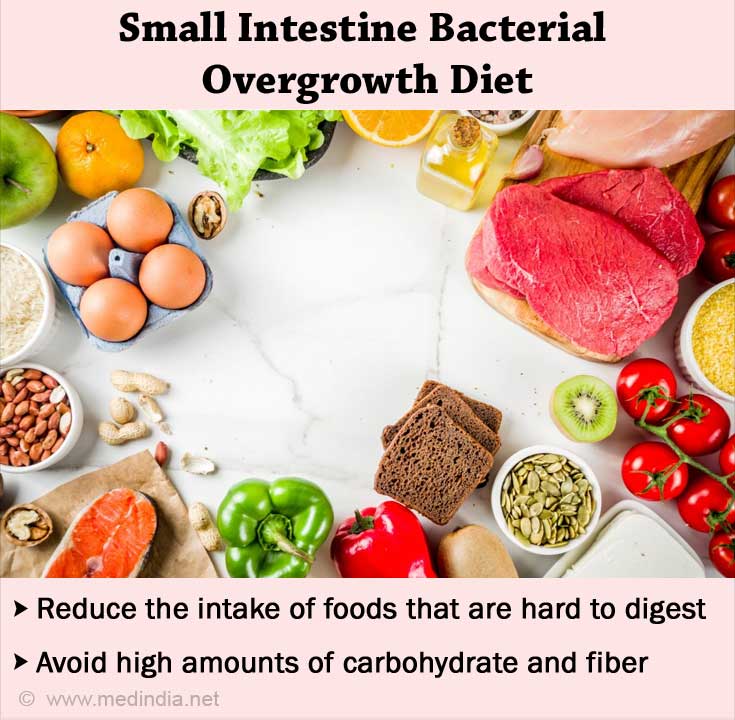
What is not allowed in a low-FODMAP diet?
- Fruits containing high levels of fructose (Eg: Apple, mango)
- Cruciferous vegetables (Eg: Cabbage, Broccoli)
- Legumes (Eg: Beans, Peanuts)
- High-fiber cereals (Eg: Granola, Oatmeal)
- Pastries and chocolates
What can you enjoy in a low-FODMAP diet?
- All kinds of meat (Chicken, Fish, Beef, and Pork)
- Soy products like soy milk and tofu
- Unsweetened breakfast cereals like plain corn flakes
- Non-starchy vegetables (Eg: Carrots, Kale, and tomato)
- Dairy products (Avoid dairy only if you are lactose intolerant)
Apart from this, incorporating herbs and fluids with anti-inflammatory and antioxidant properties is recommended for patients with SIBO.


